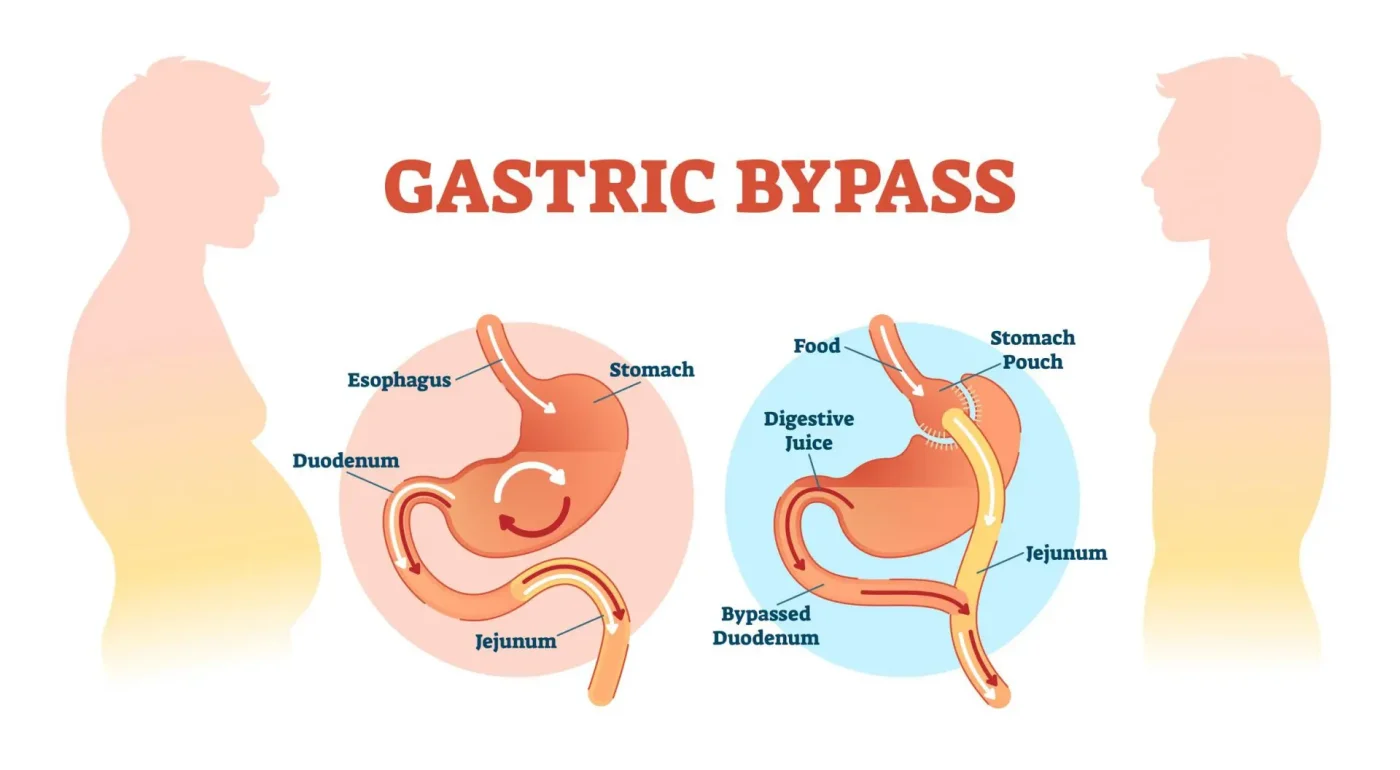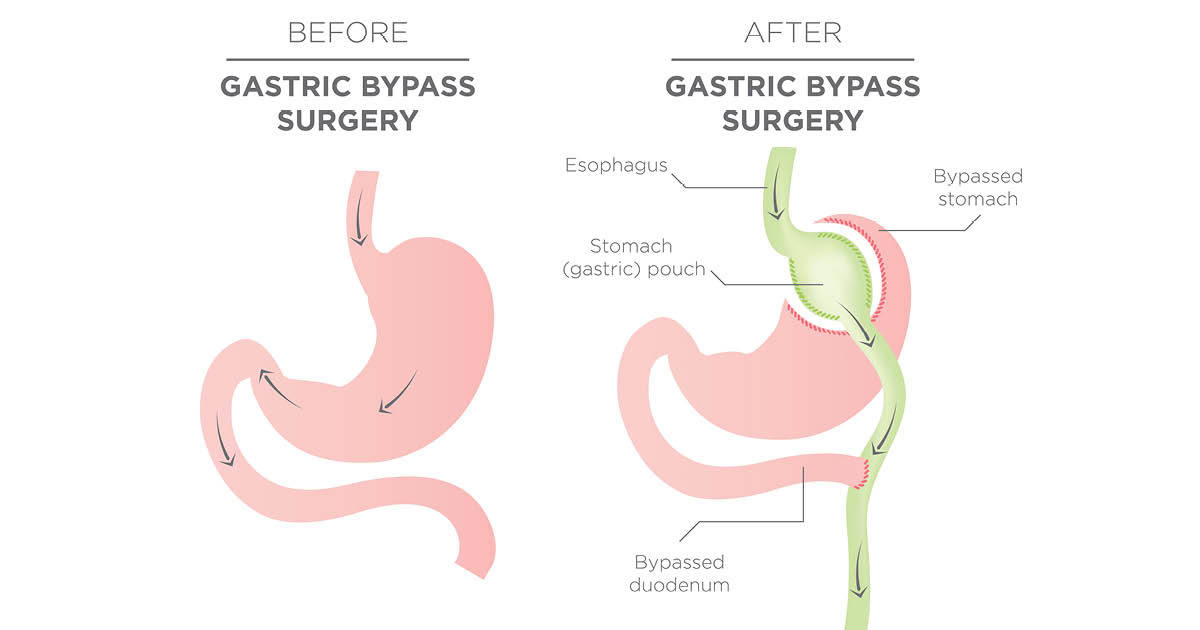Gastric Bypass in Iran
Gastric bypass in Iran, also known as Roux-en-Y gastric bypass (RYGB), is a type of weight loss surgery that alters the digestive system to help people with severe obesity lose weight. This procedure is often considered when diet and exercise have not been effective, and the individual has health issues related to obesity.
Gastric bypass surgery in Iran is a type of bariatric, or weight loss, surgery. During Gastric bypass in Iran, your physician makes changes to your stomach and small intestine to change the way they absorb and digest food. Gastric bypass aids weight loss by: Restricting the amount of food that your stomach holds.
Gastric bypass in Iran involves two main steps:
1. Creating a small stomach pouch: The surgeon divides the stomach into a small upper pouch and a larger lower pouch. The smaller pouch can hold about one ounce (30 milliliters) of food, which limits food intake and helps the patient feel full faster.
2. Bypassing a portion of the small intestine: The surgeon then connects the small stomach pouch directly to the middle part of the small intestine (jejunum), bypassing the first part of the small intestine (duodenum) and part of the jejunum. This reduces the amount of calories and nutrients absorbed by the body, contributing to weight loss.
Gastric Bypass in Iran price
The cost of gastric bypass surgery is between $3,500 to $4,500 in Iran.
In contrast, it costs between $15,000 and $25,000 in the United States

Gastric bypass in Iran Advantages
– Significant weight loss: Patients typically lose 60-80% of their excess weight within 12-18 months.
– Improvement or resolution of obesity-related health issues: Conditions such as type 2 diabetes, high blood pressure, and sleep apnea may improve or resolve following gastric bypass surgery.
– Long-term maintenance of weight loss: Studies have shown that most patients maintain significant weight loss long term.
Risks and complications
As with any surgery, there are risks and complications associated with gastric bypass surgery. Some of these include:
– Infection
– Bleeding
– Blood clots
– Leaks in the gastrointestinal system
– Nutritional deficiencies due to reduced absorption of nutrients
– Dumping syndrome, a condition in which food moves too quickly from the stomach to the small intestine, causing nausea, vomiting, and diarrhea
– Gallstones
– Bowel obstruction
Aftercare and lifestyle changes
Gastric bypass in Iran requires lifelong commitment to a healthy lifestyle, including a balanced diet and regular exercise. Patients must also take vitamin and mineral supplements to prevent deficiencies due to reduced nutrient absorption. Regular follow-ups with healthcare providers are crucial to monitor progress and address any issues that may arise.
It is essential to remember that gastric bypass surgery is not a quick fix for obesity. It is a tool that helps patients achieve and maintain a healthier weight, but it requires dedication and commitment to long-term lifestyle changes for optimal results.
Gastric bypass in Iran procedures
Gastric bypass surgery in Iran is a type of weight loss surgery. It involves creating a small pouch from the stomach and connecting it directly to the small intestine. This reduces the size of the stomach and bypasses a portion of the small intestine. This leads to weight loss in two ways:
1. The smaller stomach pouch cannot hold as much food, so a person eats less.
2. The bypass of the small intestine reduces the absorption of calories and nutrients from the diet.
There are a few variations of Gastric bypass in Iran:
• Roux-en-Y gastric bypass (RYGB) – This is the most common procedure. It creates a small pouch and attaches it directly to the small intestine, bypassing a portion of the stomach and upper small intestine.
• Mini gastric bypass – This is a less invasive form of RYGB. It has a longer pouch and a shorter bypass of the small intestine.
• Extended (distal) RYGB – This procedure bypasses a longer portion of the small intestine which leads to greater malabsorption of calories. It is often used for super obese patients.
• Loop gastric bypass – This is a less common technique. It creates a loop of small intestine to attach to the pouch, so bile and pancreatic juices can still mix with the food. It has a higher risk of complications and is rarely used today.
The benefits of gastric bypass include substantial and long-lasting weight loss. However, it does have risks like malnutrition, ulcers, and “dumping syndrome”. Patients need to follow a careful diet and take nutritional supplements for life to minimize risks and side effects. The procedure can also reduce obesity-related health conditions like diabetes, high blood pressure, and sleep apnea.
Gastric bypass surgery produces significant weight loss, with most people losing 60-80% of their excess body weight over 2-3 years. Weight loss tends to plateau at around 18-24 months after surgery. On average, patients maintain 50-60% of the loss long term if they stick to lifestyle changes. But gradual weight regain is common over the years without ongoing lifestyle modification.
Who is a candidate for gastric weight-loss surgery?
Candidates for gastric weight-loss surgery are typically individuals who are severely obese (having a body mass index (BMI) of 40 or higher), or those with a BMI of 35 or higher and at least one significant weight-related health issue such as type 2 diabetes, high blood pressure, or sleep apnea. In addition to BMI and health status, other factors such as age, overall health, and ability to comply with post-operative lifestyle changes may also be considered when determining candidacy for gastric weight-loss surgery.
It is important to note that gastric weight-loss surgery is not a quick fix or a cosmetic procedure, but rather a major surgical intervention that should be considered carefully and only after other weight loss methods have been tried without success. The decision to undergo gastric weight-loss surgery should be made in consultation with a qualified healthcare professional who can evaluate your individual health status and help you determine if the procedure is appropriate for you.
When is gastric bypass surgery not an option?
Gastric bypass in Iran may not be an option for everyone, as it is a major surgical procedure that carries risks and requires significant lifestyle changes after the surgery. Some factors that may make gastric bypass surgery not an option include:
1. Medical contraindications: There may be certain medical conditions that make undergoing surgery too risky, such as severe heart or lung disease.
2. Mental health conditions: Individuals with certain mental health conditions such as severe depression or an eating disorder may not be good candidates for Gastric bypass in Iran.
3. Substance abuse: Individuals with a history of substance abuse may not be good candidates for gastric bypass surgery, as the surgery may increase the risk of addiction transfer or lead to complications related to substance abuse.
4. Inability to commit to lifestyle changes: Gastric bypass surgery requires significant changes to diet and exercise habits, and individuals who are not willing or able to commit to these changes may not be good candidates for the surgery.
5. Pregnancy: Women who are pregnant or planning to become pregnant in the near future are generally advised to wait until after giving birth before considering Gastric bypass in Iran.
It is important to discuss your individual health status and circumstances with a qualified healthcare professional to determine if gastric bypass surgery is an appropriate option for you.
gastric bypass surgery vs sleeve
Gastric bypass patients lose between 50 to 80 percent of excess bodyweight within 12 to 18 months, on average. Gastric sleeve patients lose between 60 and 70 percent of their excess body weight within 12 to 18 months, on average.
Gastric bypass surgery and sleeve gastrectomy (also known as gastric sleeve surgery) are both types of weight loss surgery that can help individuals who are severely obese to achieve significant and sustained weight loss. However, there are some key differences between the two procedures.
Gastric bypass in Iran involves creating a small stomach pouch and rerouting the small intestine to this pouch, which restricts the amount of food that can be consumed and alters the absorption of nutrients. This leads to significant weight loss and can also improve or resolve health conditions such as type 2 diabetes and high blood pressure.
Sleeve gastrectomy involves removing a large portion of the stomach to create a smaller, banana-shaped stomach that restricts the amount of food that can be consumed. This also leads to significant weight loss, and may also improve or resolve health conditions such as type 2 diabetes.
One of the main differences between gastric bypass surgery and sleeve gastrectomy is the way in which they achieve weight loss. While both procedures restrict the amount of food that can be consumed, Gastric bypass in Iran also alters the absorption of nutrients, which can lead to more rapid weight loss and may be more effective for individuals with type 2 diabetes.
Another difference is the potential for long-term complications. Gastric bypass surgery may have a higher risk of long-term complications such as malnutrition, dumping syndrome, and bowel obstruction, while sleeve gastrectomy may have a lower risk of these complications but may have a higher risk of acid reflux and gastroesophageal reflux disease (GERD).
Ultimately, the decision to undergo gastric bypass surgery or sleeve gastrectomy should be made in consultation with a qualified healthcare professional, who can evaluate your individual health status and help you determine which procedure is appropriate for you.
gastric bypass surgery after care
After surgery, you need to take vitamins and supplements regularly, ingest high-quality nutrients, attend follow-up appointments with your bariatric surgery team, exercise, and participate in support groups.
Your emotional and physical well-being depends on your dedication to this multifaceted plan
After Gastric bypass in Iran, it is important to follow a specific aftercare plan to ensure proper healing and long-term success. Here are some key aspects of gastric bypass surgery aftercare:
1. Diet: In the first few days after surgery, you will be on a clear liquid diet, and then gradually transition to pureed and soft foods before eventually reintroducing solid foods. Your healthcare team will provide specific guidelines on what and how much you should eat at each stage of the diet.
2. Physical activity: It is important to gradually increase your physical activity after surgery. Your healthcare team may recommend starting with short walks and then gradually increasing the duration and intensity of your exercise.
3. Medications: Your healthcare team will provide specific instructions on any medications you should take after surgery, including pain medications and any supplements or vitamins you may need due to changes in nutrient absorption.
4. Follow-up appointments: You will have follow-up appointments with your healthcare team to monitor your progress and make any necessary adjustments to your diet, medications, and physical activity.
5. Psychological support: Weight loss surgery can be a significant life change, and it is important to have emotional and psychological support throughout the process. Your healthcare team may recommend counseling or support groups to help you adjust to the changes after surgery.
6. Lifestyle changes: Gastric bypass surgery is a tool to help you achieve weight loss, but long-term success requires ongoing lifestyle changes such as healthy eating habits and regular physical activity. Your healthcare team will provide guidance on how to make these changes and support you along the way.
It is important to follow your healthcare team’s specific instructions for aftercare to ensure proper healing and long-term success after Gastric bypass in Iran.

